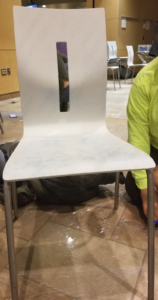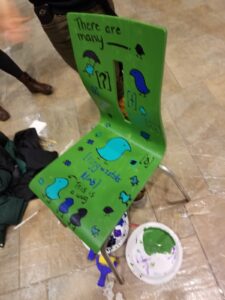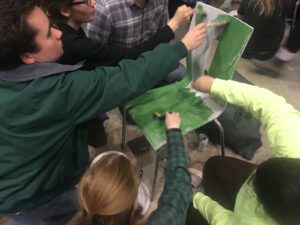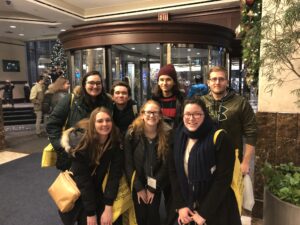Why did you choose to study Linguistics?
Choosing my major was kind of like adopting a cat. I didn’t really choose it, but rather it chose me, haha. I actually changed my major 3 times before I even went to orientation. I never had a solid idea of what I wanted to do, I never liked the mainstream subjects like math or history or science, in fact, the only thing I really liked in high school was my Chinese class. With this in mind, I only applied to three colleges with ‘undecided’ as a major. Once I got accepted, I quickly changed my major to Global Business before actually reading about the program. Once I did, I changed it to Global Studies, which I was content with until about a week before orientation. I didn’t really want to get into politics, or business, or any of that type of stuff. I took a whole day scrolling through UVM majors and reading about them, until I just went with linguistics because I knew I liked foreign languages (but I wasn’t sure what exactly it was that I liked about them). At orientation, I watched as students went off into groups with a few professors to help them pick their schedule, while I went one-on-one with Maeve, who told me that not many freshmen start off as linguistics majors, they usually come in undecided or switch their major later. This, of course, made me even more interested in the subject, and I just went with it ever since, and I don’t regret it one bit. Linguistics helped me realize that I enjoyed my Chinese class because we went in depth about what made up the language, how it evolved into what it is today, among other things. So I didn’t really choose to study linguistics… It just kinda happened.
What was your favorite LING course at UVM?
My favorite LING course (content wise) was definitely Forensic Linguistics (LING 295). It was very different than any other LING course, in fact, it even intrigued me so much that I started looking into master’s programs in forensic linguistics (but, I don’t really want to get into law enforcement, so that was quickly brushed aside). It was interesting to see the different fields you can go into with this major, as it expands way beyond what one would normally think when they hear the word ‘linguistics’ (i.e. learning foreign languages, translating, etc), because I didn’t even know that linguistics bled into many of the other mainstream programs. In terms of introductory classes, Intro to Phonology and Morphology was my favorite. Most of my interests towards linguistics, I found, are the components and what makes up the structures of different languages, and how they differ from each other. So this class was interesting in terms of seeing the patterns of where certain allophones fall in different languages, and actually being able to identify and recreate the pattern on your own.
Do you have any advice for current or prospective students?
Linguistics is a very broad major. There are a dizzying number of things you can do with a linguistics degree that may be really hard to discover at first. If you are thinking of going into the LING program, I would definitely consider trying to get a double major, as this will help to narrow down job options and job opportunities as well so you can keep on track with what you want to do and aren’t simultaneously overwhelmed with the job market (because it is super overwhelming as someone who has experienced that first hand). There may also be some LING courses that you don’t like as much as others, but don’t let that change your outlook on the program. Power through it, and I promise the classes get super interesting as you find what you enjoy and figure out your concentration (and what you actually want to do after graduation). Please, please, please keep in touch with your LING advisor as well, especially towards graduation time. They are super helpful and have more experience in where to look – they are an incredible resource to have, so take advantage of the relationship you have with them while it lasts. Every professor in the LING program is incredibly helpful, and will be glad to help you with a smile while doing so.
What are your hopes/plans for the future?
I actually graduated in December of 2018, so right now I am working at the Cyber Café in the Howe library. However, I do have a job lined up in China that I will be starting around late March or April. I will be teaching English with a company in Harbin for a year, and then after the contract is up, I plan to go to grad school for Language Documentation and Revitalization. Where? I’m not sure yet. I have a few schools in England, Arizona, and Hawaii that I’m looking at, but I guess we will see where life takes me. I suppose my ultimate goal would be to work for National Geographic and their Enduring Voices program, however that’s a long time coming (and also a wicked long shot, haha).
While these questions are tailored toward graduating seniors, they also apply to very recent graduates who are still in the process of making the post-graduation transition to the next chapter of their lives.
If you are senior or recent graduate of the Linguistics Program at UVM, and would like to share information about your undergraduate experience, send your answers to these questions to uvmlinguistics@gmail.com.


 to THIS:
to THIS:









Recent Comments